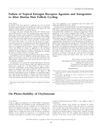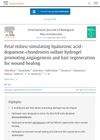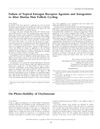11 citations,
July 2012 in “Experimental dermatology” Innate immunity genes in hair follicle stem cells might have new roles beyond traditional immune functions.
January 2018 in “Contributions to management science” MicroRNAs are crucial for skin development, regeneration, and disease treatment.
 16 citations,
December 2006 in “Expert Review of Dermatology”
16 citations,
December 2006 in “Expert Review of Dermatology” Hair follicles are essential for skin health, aiding in hair growth, wound healing, and immune function.
 68 citations,
April 2012 in “Journal of Investigative Dermatology”
68 citations,
April 2012 in “Journal of Investigative Dermatology” The conclusion is that Fgf18 and Tgf-ß signaling could be targeted for hair loss treatments.
 8 citations,
January 1998 in “Journal of Investigative Dermatology”
8 citations,
January 1998 in “Journal of Investigative Dermatology” Topical estrogen treatments did not change hair growth in certain mouse strains, questioning previous findings on their role in hair growth control.
 1 citations,
October 2022 in “Annual review of cell and developmental biology”
1 citations,
October 2022 in “Annual review of cell and developmental biology” The nervous system helps control stem cell behavior and immune responses, affecting tissue repair and maintenance.
1 citations,
October 2016 Genetic hair disorders can indicate other hidden health problems.
19 citations,
April 2020 in “Journal of ethnopharmacology” Prunus mira nut oil helps hair grow by affecting the Wnt/β-catenin signaling pathway.
 3 citations,
July 2023 in “International Journal of Biological Macromolecules”
3 citations,
July 2023 in “International Journal of Biological Macromolecules” The hydrogel helps heal wounds and regrow hair by mimicking a baby's environment.
 5 citations,
December 2021 in “Frontiers in Cell and Developmental Biology”
5 citations,
December 2021 in “Frontiers in Cell and Developmental Biology” Enzymes called PADIs play a key role in hair growth and loss.

Melatonin helps grow cashmere goat hair by activating the Wnt10b gene.
 April 2023 in “Journal of Investigative Dermatology”
April 2023 in “Journal of Investigative Dermatology” A protein called MPZL3 in mitochondria slows down hair growth and could be a target for treating hair growth disorders.
 January 2023 in “Journal of cosmetic dermatology”
January 2023 in “Journal of cosmetic dermatology” The synthetic retinoid EC23 thickens skin and promotes hair growth more effectively and with a lower dose than natural retinoids.
 March 2024 in “Indian Journal of Dermatology/Indian journal of dermatology”
March 2024 in “Indian Journal of Dermatology/Indian journal of dermatology” Exosomes could be key in treating skin conditions and healing wounds.
 1 citations,
January 2024 in “Advanced science”
1 citations,
January 2024 in “Advanced science” Fibronectin-attached cell sheets improve wound healing and are safe and effective.
45 citations,
April 2001 in “The journal of investigative dermatology/Journal of investigative dermatology” Different Myc family proteins are located in various parts of the hair follicle and may affect stem cell behavior.
 2 citations,
January 2022 in “International Journal of Medical Sciences”
2 citations,
January 2022 in “International Journal of Medical Sciences” Kartogenin may help treat hair loss by promoting hair growth and extending the hair growth phase.
 4 citations,
December 2021 in “The journal of investigative dermatology/Journal of investigative dermatology”
4 citations,
December 2021 in “The journal of investigative dermatology/Journal of investigative dermatology” Overactive Wnt signaling in mouse skin stem cells causes acne-like cysts and shrinking oil glands, which some treatments can partially fix.
9 citations,
June 2019 in “Cell cycle/Cell cycle (Georgetown, Tex. Online)” A specific RNA increases hair stem cell growth and skin healing by affecting a protein through interaction with a microRNA.
 February 2024 in “Journal of medicinal food”
February 2024 in “Journal of medicinal food” The research found a way to develop hair growth materials by targeting a specific signaling pathway.
 January 2016 in “Korean Journal of Pharmacognosy”
January 2016 in “Korean Journal of Pharmacognosy” Grateloupia elliptica, a type of marine algae, may promote hair growth by activating a specific cell growth pathway.
 6 citations,
January 1998 in “Journal of Investigative Dermatology”
6 citations,
January 1998 in “Journal of Investigative Dermatology” Estrogen receptors may not affect mouse hair growth as previously thought, and oxybenzone in sunscreen is stable in sunlight.

The document concludes that activating hair roots is important for improving hair growth and preventing hair loss.
 2 citations,
January 2017 in “Journal of Cosmetics, Dermatological Sciences and Applications”
2 citations,
January 2017 in “Journal of Cosmetics, Dermatological Sciences and Applications” TrichoTech™ may help hair growth and skin repair by increasing fibroblast growth and activity.
 April 2018 in “The journal of investigative dermatology/Journal of investigative dermatology”
April 2018 in “The journal of investigative dermatology/Journal of investigative dermatology” 17β-estradiol may help hair growth by increasing cannabinoid receptor type 1.
April 2021 in “The journal of investigative dermatology/Journal of investigative dermatology” CTCF protein is essential for skin and hair follicle development in mice.
23 citations,
October 1996 in “Dermatologic clinics” Genes affect cytokine production, which can influence chronic diseases, and certain interventions may help prevent related molecular damage.
 39 citations,
January 2013 in “Journal of Investigative Dermatology”
39 citations,
January 2013 in “Journal of Investigative Dermatology” Changing Wnt signaling can lead to more or less hair growth and might help treat hair loss and skin conditions.
 7 citations,
August 2017 in “PloS one”
7 citations,
August 2017 in “PloS one” Key genes linked to hair growth and cancer were identified in hairless mice.
 April 2018 in “Journal of Investigative Dermatology”
April 2018 in “Journal of Investigative Dermatology” Removing STAT5 from 3D-cultured human skin cells reduces their ability to grow hair.





















